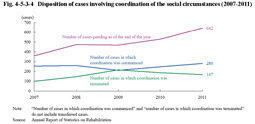2 Medical care through hospitalization
Those with the decision on a need for hospitalization are hospitalized in designated inpatient care hospitals (designated by the Minister of Health, Labour and Welfare) where they receive specialized medical care in accordance with the system. Designated inpatient care hospitals provide specialized and careful medical care according to the stage of the symptoms of the subject person and with a focused allocation of human and material resources.
In order to facilitate the smooth reintegration back into society of the subject persons, probation offices make coordination of the social circumstances toward their discharge, from the beginning of their hospitalization. In the course of the coordination, rehabilitation coordinators of probation offices visit the designated inpatient care hospitals where the subject persons are hospitalized to listen to their desires concerning their living after being discharged and to discuss with the staff of the hospitals the policies of the coordination. The results of those activities are then used to make necessary coordination with respect to the relationship between the subject person and his/her family, etc. and with respect to ensuring that they receive necessary assistance such as mental health and welfare services, etc. after being discharged, through the cooperation with designated outpatient care hospitals and prefectural/municipal mental health and welfare institutions, etc. in the regions where they plan to reside.
Fig. 4-5-3-4 shows the disposition of cases involving coordination of the social circumstances over the last five years. The number of cases in which coordination was commenced in 2011 (excluding cases received by transfer) was 280 and that pending as of the end of the same year 642.
Fig. 4-5-3-4 Disposition of cases involving coordination of the social circumstances (2007-2011)
